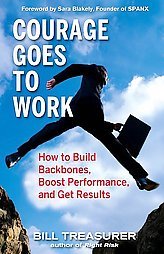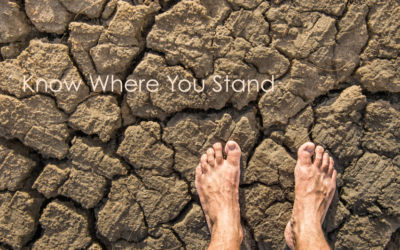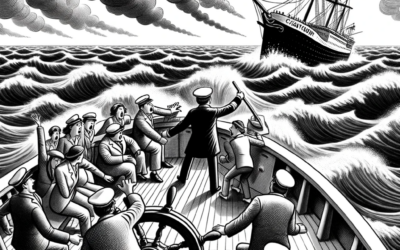 Bill Treasurer is founder and Chief Encouragement Officer at Giant Leap Consulting (GLC), a courage-building company that exists to help people and organizations live more courageously. Bill is also the author of Courage Goes to Work (Berrett-Koehler Publishers, 2008), a book about how to inspire more courageous behavior in workplace settings. He has been cited by 100s of newspapers and magazines and has published many other books. Interestingly he was also on theUS High Diving Team making over 1,500 dives at over 100 feet. Now that is courage!
Bill Treasurer is founder and Chief Encouragement Officer at Giant Leap Consulting (GLC), a courage-building company that exists to help people and organizations live more courageously. Bill is also the author of Courage Goes to Work (Berrett-Koehler Publishers, 2008), a book about how to inspire more courageous behavior in workplace settings. He has been cited by 100s of newspapers and magazines and has published many other books. Interestingly he was also on theUS High Diving Team making over 1,500 dives at over 100 feet. Now that is courage!
I asked Bill to be interviewed because of the connection between his work and Just Ask Leadership. It takes a great deal of courage at times to ask certain questions. How you ask, as Bill points out, is just as important.
Gary Cohen: Bill Treasurer, you have a unique background that would seem to inform your work today as the leading courage consultant around the world. Can you tell us how you came to where you are today?
Bill Treasurer: I started my company, Giant Leap Consulting, in 2002, after spending 6 years as an executive in Accenture’s change management practice. I named the company Giant Leap Consulting because I used to take “giant leaps” for a living. I am a former member of the U.S. High Diving Team who overcame a debilitating fear of heights to, eventually, perform over 1500 high dives from heights that scaled to over 100 feet – three times higher than the highest platform in the Olympic games. Thus, it was my own personal encounters moving through fear, and therefore gaining courage, that set me on my path.
What question were you answering in writing this book?
How can courage, which we know is so essential to living a full life, be built, strengthened, and consistently applied in workplace settings?
Who is the audience you had in mind in writing your book?
The old adage rings true; change starts at the top. Thus the main audience of the book is leaders and managers – people who have the power to put courage inside people (encouragement).
You must be very proud to be one of the bestselling books in China. What is it about your message and the culture of China that is making your book sell off the shelves?
Having the book become a bestseller in China was a wonderful surprise. It made me really think about the motivations and ambitions of Chinese workers. Business readers in China seem captivated by the idea of being more courageous at work. What is as intriguing as the book becoming a bestseller, is the number of readers who are writing positive reviews about the book…as of yesterday the book had 43 reviews. An unusually high number by most standards.
What have you learned about the Chinese culture that would help leaders in different countries be more successful in doing business in China?
That business in China is to be taken very, very seriously! This is not the China of old, making cheap and low quality products. China today is fast-becoming a first-world superpower in every sense of the word. Western leaders who aspire to do business in China would be wise to drop any notion that somehow the Chinese are less business-minded. Western leaders would fare far better by adopting a learning and listening posture, instead of swaggering into China full of Western ego and arrogance.
Courage is one of the words that you hear in leadership courses. It is often talked about in terms of heroic leaders like Mother Teresa, Gandhi, or Martin Luther King. Often those sitting in one of these leadership sit-and-soak-it-up-type training events don’t really know how to connect with that type of courage – you know, the life-is-on-the-line type because most leaders today are not facing life or death situations. How does your view of courage help the leader who is not heroic and still wants to be a great leader?
We need to steal courage back from the gods and bring it back to us mortals here on earth. When we create such a high standard for courage that it’s only attainable by spiritual, political, or military heroes, we push courage beyond our grasp. What’s needed is a more tempered, everyday courage. Courage doesn’t need to be grandiose to be effective. Each person has the capacity to demonstrate their courage in small, but important ways every day. The most essential element involved in being courageous is to not let fear dictate your actions.
Bill, you talk about three types of courage in your work. Can you help me understand those three types and give an example of how we would see them in the workspace?
Nearly all courageous acts can be divided among three forms of courage. They are:
TRY Courage: The courage of first attempts, pioneering efforts, and stepping up to the plate (initiative). We see TRY Courage in action when people pursue “stretch goals”, for example.
TRUST Courage: The courage of relying on others, assuming that other people have positive intentions, and embracing vulnerability. We see TRUST Courage being applied when workers give coworkers or bosses the benefit of the doubt, without scrutiny or suspicion.
TELL Courage: The courage of assertiveness, voicing honest opinions, and communicating without hidden agendas. We witness TELL Courage when workers speak the unvarnished and hard-to-hear truth in order to help the organization remain true to its values.
You have worked with some of the nation’s largest corporations in helping them build greater courage in their culture to move forward. Can share your most rewarding engagement and what made it that way?
I was fortunate to work on a Native American reservation in rural Oregon. I was brought in to help the Native Americans, along with a leading management consulting company, launch a new high-tech call center. My company helped the Native Americans and the management consulting company define a set of core values that would help them become a world-class commercial enterprise. It was very meaningful work, because the call center would produce sustainable jobs that were far more professional and lucrative than the jobs being produced by the reservation’s gambling casino.
The work was unlike any other we’ve ever done, and produced a unique set of core values – literally and symbolically. Not only were the core values written down, they were also symbolically rendered as paintings. I talk about this unique engagement in Courage Goes to Work. There was a bunch of TRY and TRUST Courage being displayed throughout the engagement!
You talk about building courage. How does one do strength building of this mental muscle? (Interview Continued)
Related Posts:
Top 6 Ways To Build Courage & 5 Ways To Handle A Down Economy
Top 10 Questions To Build Courage
Top 5 Questions Courageous Leaders Should Ask Their Team



